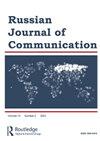Russia–U.S. kruzhki-storyshops and education cultural diplomacy as soft power: communicating metaphorical shared experiences in the Era of disruptive innovation
Q1 Social Sciences
引用次数: 0
Abstract
ABSTRACT This essay adopted the rhetorical tradition from communication theory’s seven traditions. Within this rhetorical tradition, the essay centered on the roles of metaphors in communication. The essay adapted the categories of Nye’s power typology to frame its rhetoric. Historically, Russian kruzhki storytelling circles were elite-centric where abstract and action ideas were generated and distributed. Today’s Russian kruzhki and their American storyshop equivalents are more mass-centric. The authors highlight three types of Russia–U.S. kruzhki-storyshops: sports diplomacy and hockey metaphor, comrade cowboys diplomacy and horse metaphor, and nongovernment organization diplomacy and innovation and entrepreneurship metaphor, which serve as models for education cultural diplomacy. To improve Russia–U.S. relations via communications, the authors propose discovering and sharing the rhetoric of common metaphors. The authors think that crafting the rhetoric of metaphors will advance communication theory and the soft-power practices among Russians and Americans, especially in the Era of Disruptive Innovation.Russia-U.S。作为软实力的文化外交:在颠覆性创新时代沟通隐喻的共享经验
本文采用了传播学七大传统中的修辞学传统。在这一修辞传统中,本文以隐喻在交际中的作用为中心。这篇文章采用了奈的权力类型学的范畴来构建其修辞。从历史上看,俄罗斯的kruzhki故事圈是以精英为中心的,抽象和行动的想法在这里产生和传播。今天的俄罗斯kruzhki和他们在美国的故事店更以大众为中心。作者强调了三种类型的俄美关系。Kruzhki-storyshops:体育外交与冰球隐喻、牛仔同志外交与马隐喻、非政府组织外交与创新创业隐喻,为教育文化外交提供了借鉴。为了改善俄美关系。通过交流建立关系,作者提出发现和分享共同隐喻的修辞。作者认为,精心制作隐喻修辞将推动俄罗斯人和美国人的传播理论和软实力实践,特别是在破坏性创新时代。
本文章由计算机程序翻译,如有差异,请以英文原文为准。
求助全文
约1分钟内获得全文
求助全文
来源期刊

Russian Journal of Communication
Social Sciences-Political Science and International Relations
自引率
0.00%
发文量
0
期刊介绍:
Russian Journal of Communication (RJC) is an international peer-reviewed academic publication devoted to studies of communication in, with, and about Russia and Russian-speaking communities around the world. RJC welcomes both humanistic and social scientific scholarly approaches to communication, which is broadly construed to include mediated information as well as face-to-face interactions. RJC seeks papers and book reviews on topics including philosophy of communication, traditional and new media, film, literature, rhetoric, journalism, information-communication technologies, cultural practices, organizational and group dynamics, interpersonal communication, communication in instructional contexts, advertising, public relations, political campaigns, legal proceedings, environmental and health matters, and communication policy.
 求助内容:
求助内容: 应助结果提醒方式:
应助结果提醒方式:


